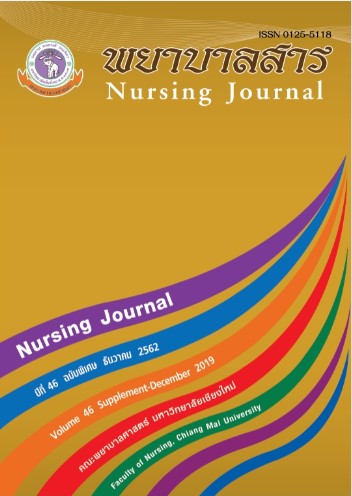Head Nurses’ Paternalistic Leadership and Organizational Citizenship Behavior of Nurses in the People’s Hospitals of Dali, the People’s Republic of China
Keywords:
Paternalistic Leadership, Organizational Citizenship Behavior, People’s HospitalsAbstract
Organizational citizenship behavior of nurses is an important component to achieve organizational goals. The purpose of this descriptive correlational study was to examine the level of head nurses’ paternalistic leadership and nurses’ organizational citizenship behavior and the relationship between the two variables. Samples were selected using proportionate stratified random sampling, including 271 nurses from two People’s hospitals of Dali, the P.R China. Research instruments were the Paternalistic Leadership Scale (PLS) and Taiwan Organizational Citizenship Behavior Scale (TOCB). The reliability of PL and TOCB was 0.88, and 0.93 respectively. Data were analyzed using descriptive statistics and Spearman’s Rank-Order Correlation. The results of this study were as follows:
- The overall paternalistic leadership and dimensions of benevolence and authoritarian were at a moderate level whereas moral leadership was at a high level.
- The overall and each dimension of organizational citizenship behavior were at a high level.
- The overall paternalistic leadership and dimensions of benevolent and moral leadership were moderately positively related to organizational citizenship behavior while authoritarian leadership was weakly negatively related to organizational citizenship behavior.
The results of this study provide basic information for nurse administrators to develop policies and strategies to improve organizational citizenship behavior in order to enhance the quality of nursing care and organizational effectiveness
References
Ai, Y., Yang, S. G., Zhou, M. J. & Liu, N. (2016). Ethical leadership of head nurses and felt obli-gation on work outcomes of nurses. [in Chinese]. Modern Hospital, 16 (6): 889-893.
Barnard, C. I. (1938). The functions of the executive. Harvard University Press.
Cheng, B. S., Chou, L. F., Wu, T. Y., Huang, M. P., & Farh, J. L. (2004). Paternalistic leadership and subordinates responses: Establishing a leadership model in Chinese organizations. Asian Journal of Social Psychology, 7, 89-117.
Chi, C. G., Maier, T. A., & Gursoy, D. (2013). Employees’ perceptions of younger and older managers by generation. International Journal of Hospitality Management, 34, 42-50.
Chu, C. I., & Hsu, Y. F. (2012). Hospital nurse job attitudes and performance: The impact of employment status. Journal of Nursing Research, 19(1), 53-60.
Dong, M. J. (2013). The Study of the relationship between Paternalistic Leadership style and Orgnizational Citizenship Behavior of X Radio Station. [in Chinese]. (Unpublished mas-ter’s thesis). Southwest Jiaotong University, China.
Farh, J. L., Earley, P. C., & Lin. S.C. (1997). A cultural analysis of justice and organizational citi-zenship behavior in Chinese society. Administration Science Quarterly, 42(3), 421-444.
Kang, T. L. (1999). The development of the Chinese leadership model and its application in technician education (in Chinese), Global Journal of English Education, 5(2), 139-146.
Lee, J. (1996). Culture and management--a study of small Chinese family business in Singapore. Journal of Small Business Management, 34(3), 63.
Li, R. (2013). The Research on the impact of Paternalistic Leadership on Organizational Citi-zenship Behavior: Based on the Moderator effect of person-organization fit. [in Chi-nese]. (Unpublished master’s thesis). Nanjing University of technology, China.
Lin, S. H., & Lei, H. C. (2013). The evolution trend of medical marketization in China: The medi-cal market index and its application. [in Chinese]. Chinese Hospitals, 12 (07), 192-201.
Lv, A., Shen, X., Cao, Y., Su, Y., & Chen, X. (2012). Conscientiousness and organizational citi-zenship behavior: The mediating role of organizational justice. [in Chinese]. Social Be-havior and Personality: international journal, 40(8), 1293-1300.
Ma, S. M. (2015). The influence of the management idea of the head nurse on nursing staff. [in Chinese]. China Academic Journal Electronic Publishing House, 15 (57): 43-44.
Qin, G. (2014). Investigation regarding health care reform [in Chinese]. Yunnan Provincial Bu-reau of Health. Retrieved November 14, 2015 from http://www.pbh.yn.gov.cn/content.
Organ, D. W., Podsakoff, P. M., & MacKenzie, S. B. (2006). Organizational citizenship behavior: Its nature, antecedents, and consequences. USA: Sage Publications, Inc.
Podsakoff, N. P., Whiting, S. W., Podsakoff, P. M., & Blume, B. D. (2009). Individual- and organi-zational-level consequences of organizational citizenship behaviors: A meta- analysis. Journal of Applied Psychology, 94(1), 122-141. doi: 10.1037/a00 13079
Sivanathan, N., Pillutla, M. M., & Murnighan, K. J. (2008). Power gained, power lost. Organiza-tional Behavior and Human Decision Processes, 105(2), 135–146.
Sun, L. K. (2001). The Chinese national character: From nationhood to individuality. ME Sharpe.
Tang, Q. (2012). The influences research of leadership style on occupational psychology and job performance of the doctors. [in Chinese]. (Unpublished master thesis). Chinese Medical University, China.
Xue, T. T. (2014). The paternalistic leadership’s mechanism research on organizational citi-zenship behavior: Based on the intermediary effect of affective commitment. [in Chi-nese]. (Unpublished master’s thesis). Anhui University, China.
Yang, Q. Q. (2012). Leader-member exchange and organizational citizenship behaviors among nurses in Tertiary Hospital, Yunnan Province, the People's Republic of China. (Unpublished master’s thesis). Chiang Mai University, Thailand.
Zhang, Z. G., Cui, T. T., & Yu, C. P. (2015). Study on the Influence of Paternalistic Leadership on Organizational Effectiveness: Knowledge Sharing Intention as Mediator [in Chinese]. Science and Technology Management Research, 9(36), 269-273.
Zhang, P. C., Liu, W. X., & Wei, W. (2012). The mechanism of impacts of paternalistic leader-ship and organizational values on employee’s multiple knowledge behaviors. [in Chi-nese]. Journal of Management Science, 23(2): 77-85.
Downloads
Published
How to Cite
Issue
Section
License
บทความที่ได้รับการตีพิมพ์เป็นลิขสิทธิ์ของวารสารพยาบาลสาร
ข้อความที่ปรากฏในบทความแต่ละเรื่องในวารสารวิชาการเล่มนี้เป็นความคิดเห็นส่วนตัวของผู้เขียนแต่ละท่านไม่เกี่ยวข้องกับมหาวิทยาลัยเชียงใหม่ และคณาจารย์ท่านอื่นๆในมหาวิทยาลัยฯ แต่อย่างใด ความรับผิดชอบองค์ประกอบทั้งหมดของบทความแต่ละเรื่องเป็นของผู้เขียนแต่ละท่าน หากมีความผิดพลาดใด ๆ ผู้เขียนแต่ละท่านจะรับผิดชอบบทความของตนเองแต่ผู้เดียว






